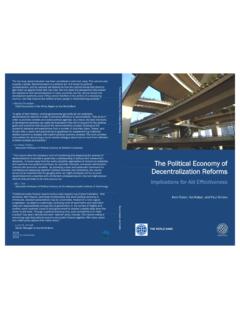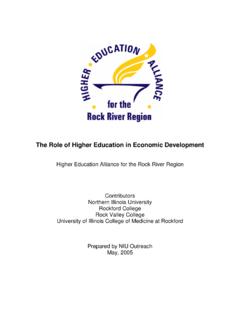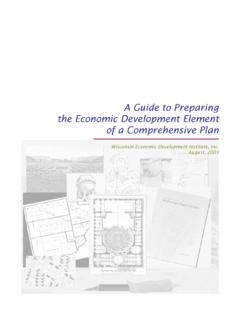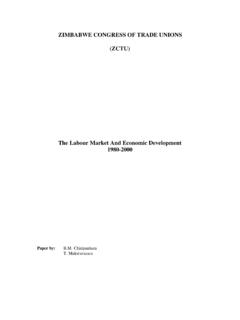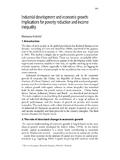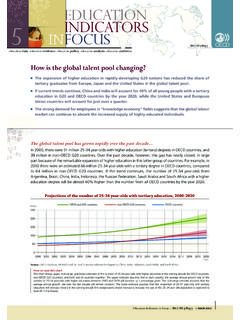Transcription of Economic Returns to Investment in Education - World Bank
1 Economic Returns to Investment in EducationCHAPTER 2 The main conclusion of the previous chapter is that the MENA regionhas invested heavily in Education over the past few decades and as a con-sequence has improved the level, quantity, and quality of human question to be addressed in this chapter is what the developmentoutcomes of this Investment have been. In other words, have improve-ments in human capital contributed to Economic growth, better incomedistribution, and less poverty in MENA countries?The discussion is organized in three sections: the first covers the re-lationship between Education and Economic growth, the second ad-dresses the relationship between Education and income distribution, andthe third section examines the relationship between Education andpoverty. In each section, we elaborate the arguments for the kind of re-lationship that should exist, explore whether that relationship holds inthe MENA region, and offer alternative explanations when it does and Economic GrowthPer capita Economic growth in the MENA region in the past 20 years hasbeen relatively low, in part because of high population growth rates, andin part because many MENA countries still depend on oil exports foreconomic growth and oil prices remained relatively low through the1980s, 1990s, and early 2000s.
2 In addition, the region generally lacks sig-nificant dynamic sectors that can compete internationally and is home tolarge informal labor markets, mainly in low-level services. These charac-teristics contrast sharply with East Asia and the more dynamiceconomies of Latin these conditions, we would not expect to see a strong relation-ship in the MENA region as a whole between Investment in human cap-ital especially Investment in secondary and tertiary Education and3902-Chap02-R1
3 12/5/07
4 3.
5 16 PM
6 Page
7 3940 The Road Not Traveledeconomic growth. This turns out to be the case. Thus, the MENA ex-perience brings home the idea that Investment in human capital does notby itself generate Economic growth. Earlier findings about virtuous circlesin East Asia claiming that high growth rates in that region were drivenby Investment in Education are not incorrect, they are just high levels of human capital in the 1960s and rapid increasessince then were undoubtedly important to East Asian growth. In the caseof the MENA region, other growth-enhancing policies were not inplace, and this has led to less than full realization of the benefits of in-vestment in in Education and Economic Growth:A Broad PerspectiveDoes Investment in Education necessarily enhance Economic growth?There are compelling reasons that it should, but the empirical evidencedoes not always support this Rationale for a Positive Education Economic Growth are willing to take more years of schooling partly becausethey can earn more and get better jobs, on average, with more many, more schooling can also be a source of social mobility.
8 Simi-larly, nation-states and regions are interested in raising the average levelof schooling in their population, in part, because they think that doingso will improve productivity, raise the quality of jobs in the economy, andincrease Economic link between Education and Economic growth in some of theearly work on the economics of Education was based on the argumentthat a major effect of more Education is that an improved labor force hasan increased capacity to produce. Because better-educated workers aremore literate and numerate, they should be easier to train. It should beeasier for them to learn more complex tasks. In addition, they shouldhave better work habits, particularly awareness of time and dependabil-ity. But exactly how Education increases productivity, how important it is,and in what ways it is important are questions that have no definite an-swers. A shortage of educated people may limit growth, but it is unclearthat a more educated labor force will increase Economic growth.
9 It is alsounclear what kindof Education contributes most to growth generalschooling, technical formal training, or on-the-job training and whatlevelof Education contributes most to growth primary, secondary, orhigher Education . One of the clues in support of the conclusion that Education does con-tribute to growth is that countries with higher levels of Economic growth02-Chap02-R1
10 12/5/07





